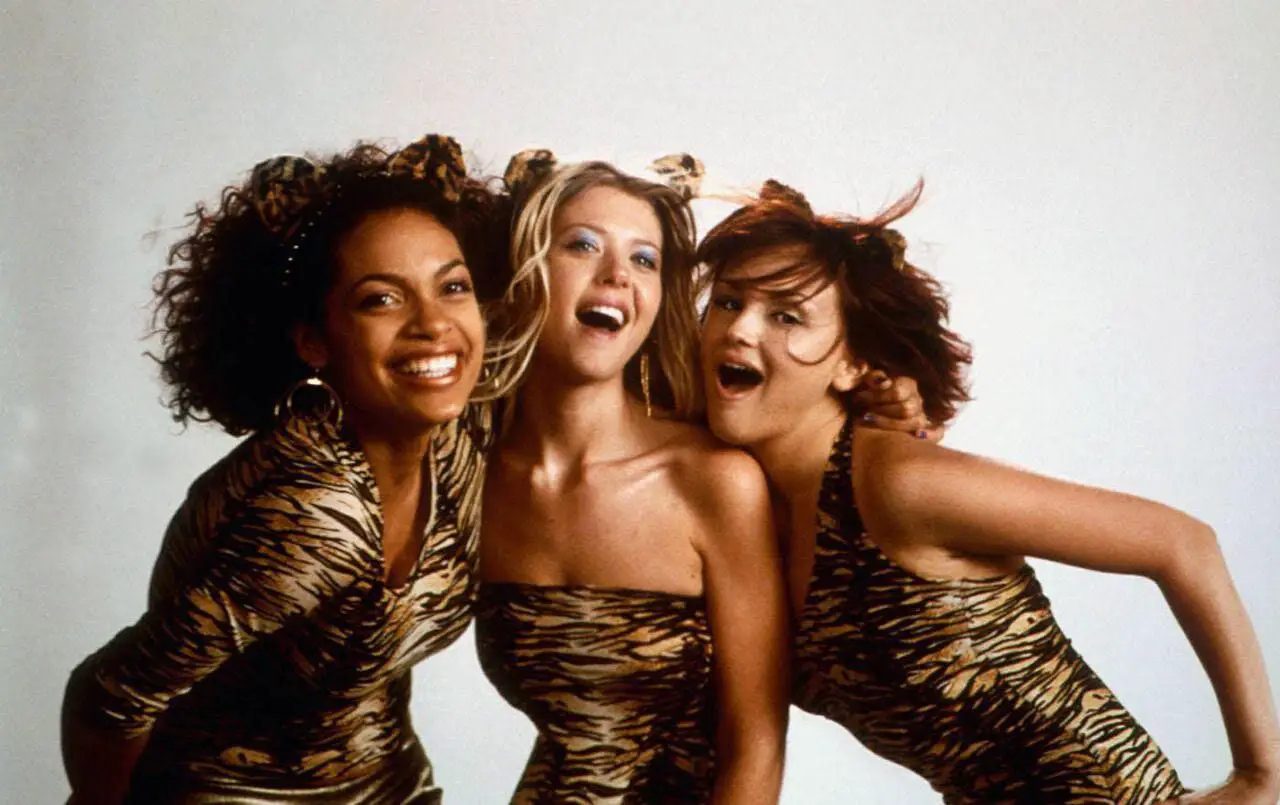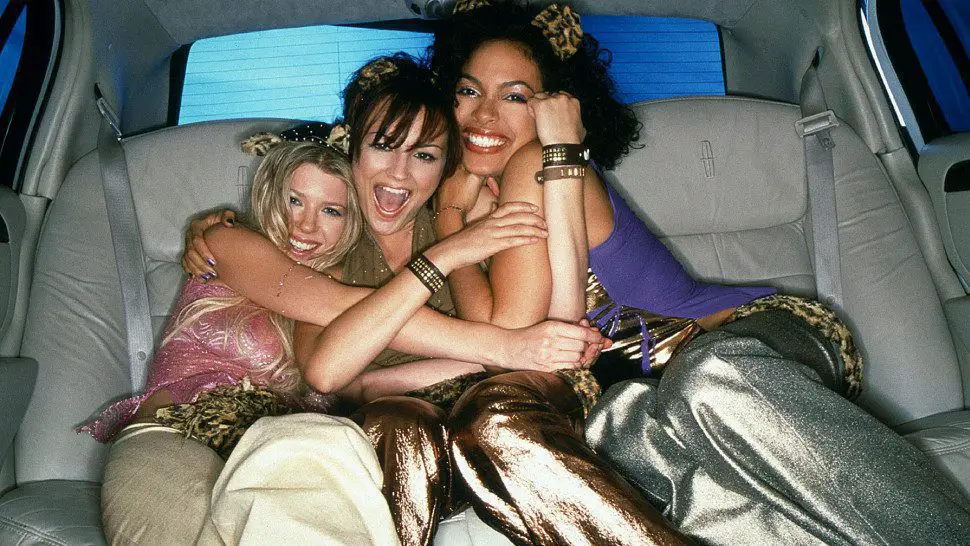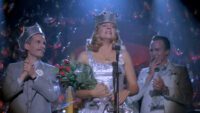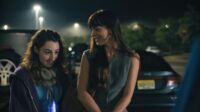In 2001, Josie and the Pussycats was a critical and commercial failure that didn’t even recoup its budget at the box office. It was a devastating outcome for a movie that was poised for greatness. Written and directed by teen movie veterans Harry Elfont and Deborah Kaplan of Can’t Hardly Wait fame, Josie and the Pussycats starred early-2000s royalty like Tara Reid, Rachael Leigh Cook, Rosario Dawson, Breckin Meyer, Alan Cumming, Parker Posey, Missi Pyle, Donald Faison, and Seth Green. The characters were adapted from the beloved Archie comics and it was anticipated that the movie would cash in on the nostalgia factor.
Upon its release, it became very clear that there was a disconnect between the filmmakers and the viewers. Famed critic Roger Ebert gave it half a star and opened his review with, “Josie and the Pussycats are not dumber than the Spice Girls, but they’re as dumb as the Spice Girls, which is dumb enough.” A critic from the Washington Post called it an indicator of “moviedom’s creative poverty.” Even audience members on Rotten Tomatoes landed at a consensus rating of 52%.
And yet, despite the barrage of negative opinions, there has always been a vocal minority who proclaimed Josie and the Pussycats was ahead of its time. Slowly, but surely, critics started to take notice of the movie’s growing cult status and revisited it. In 2009, The A.V. Club declared the movie a “secret success.” Eleven years later in 2020, Refinery29 published an article in their “Writing Critics’ Wrongs” series about how misunderstood the film was. The Fader released an oral history of the film’s soundtrack in 2017 and called Josie and the Pussycats “the best fake rock band ever.”
So what took people so long?
Those who did see Josie and the Pussycats back in 2001 were introduced to the hottest boy band in the world, DuJour (composed of Faison, Green, Meyer, and Martin). They’re gathered on the tarmac and about to embark on their world tour. With them is a representative from their record label, Wyatt (Cumming), who is there to oversee the logistics of the tour. On the plane en route to their first stop, the band brings up a concern to Wyatt. There’s a strange message hidden in their songs that is repeated over and over again. The band just wants to know what it means and why it’s there. Wyatt pretends to be shocked at learning about the message, but then quickly excuses himself. He goes into the cockpit and he and the pilot parachute out of the plane. The band is left to their own devices to safely land the plane.
Wyatt ends up in the sleepy town of Riverdale, home to Josie (Cook), Mel (Reid), Val (Dawson), and their band, The Pussycats. They have big-city dreams of sold-out tours, number one songs, and record deals, but they’re playing in local bowling alleys instead. Unbeknownst to them, Wyatt has been tasked by his MegaRecords boss, Fiona (Posey), to find a new band by the end of the day. Wyatt and the Pussycats’ paths cross and they are swept into a whirlwind of success and celebrity beyond their wildest dreams.

A main criticism of Josie and the Pussycats was the overabundance of product placement, including anything and everything from Puma to McDonald’s to Target to Tide. Somehow, critics took these product placements at face value, refusing to believe that a movie geared toward teens could make an interesting social commentary. The dichotomy is clear. When The Pussycats are in their Riverdale home, it’s completely devoid of advertisements. Their house is the sort of boho chic that a group of three young women in a rock band would feel most comfortable living in. After they sign with MegaRecords, the advertisements are everywhere. A McDonald’s bathroom, a Revlon penthouse suite, and a city block stuffed to the brim with billboards. Perhaps most hilariously, Josie and Alan M. (Gabriel Mann) go to an aquarium where they share an almost-kiss in front of a massive dolphin tank with an Evian poster taking up the majority of the background.
Historically, chick flicks and romantic comedies (both of which Josie and the Pussycats could be classified as) have been looked down upon as a lesser genre. Women are allowed to be the joke, but they can’t be the ones who are telling the jokes. Perhaps that’s part of the reason the movie found limited success at the time of its original release. The people who bring down the government’s secret, evil plan are three young women from a small town who use the power of friendship.
While representation for young female protagonists has improved in the years since, there’s still a mentality that exists that female-led movies are exclusively for women. Male-led movies, however, are supposedly universally relatable. Most recently, Pixar’s Turning Red was criticized for being impossible to relate to unless the viewer was also a Chinese-Canadian preteen. That sort of reductive thinking—that if fun and centered on young women, a film cannot have merit or be profound—pushes movies like Josie and the Pussycats out of the cultural canon. The film was only looked at from a surface level viewpoint which was disrespectful to the creators of the project. By not acknowledging the movie’s value and depth, critics are implying that young women are not smart enough to be in on the joke.

It’s shocking that critics, including Ebert, couldn’t see past the very obvious tongue-in-cheek mentality that runs through the film’s DNA. It’s not even profoundly subtle. A movie that begins with a performance of a song called “Backdoor Lover” by a boy band is not concerned with nuance. The central conflict of the film is the government using MTV and pop music to broadcast subliminal messages that will brainwash the youth of America. The heroes, Josie, Mel, and Val, encourage people to enjoy the things that make them happy, even if that’s not what the rest of the world likes. The moral of the story, because it is a teen movie after all, is to be yourself. The overwhelming product placement exists to show how inundated young people are with advertising: that spending money to keep up with the hottest trend is the way value is added to someone’s life.
Many movies have tried, but Josie and the Pussycats remains one of Hollywood’s most entertaining damnations of consumerism. Society is getting to a point where it resembles the aggressive product placements of the movie, but without critiquing it in the way Josie and the Pussycats did. The jarring Papa John’s fight sequence in the movie version of Uncharted, the emergence of Instagram influencer culture, and the exclusivity of clothing drops from companies like Supreme are all examples of how consumerism has permeated our culture. This is the future Josie and the Pussycats warned us about.
Josie and the Pussycats is one of the few live-action adaptations of a cartoon that adds something interesting and new to beloved characters. The script is hilarious, but the band Josie and the Pussycats is one of the best fictional rock and roll bands of all time. Letters to Cleo frontwoman Kay Hanley lends her voice to Josie for a rollicking soundtrack featuring songs written by Elfont, Kaplan, and the late great Adam Schlesinger.
In a victory lap sixteen years later, Hanley took the stage with members of the album’s recording musicians at the Ace Hotel in Los Angeles to perform a one night only, sold out show. This event was part-concert, part-Q&A with the cast and writer/directors, part-album release for the soundtrack’s vinyl pressing, and part-film screening. It was a triumph that was unfathomable at the movie’s release. Audience members were dressed in their finest leopard-print clothes and their kitten ears, filling the entirety of the Ace Hotel’s 1,600-seat theatre.

The reception at the show overwhelmed Hanley who teared up during the ballad, “You Don’t See Me.” It’s no question that this film greatly impacted everyone involved. Not just the actors, directors, and writers, but the audience’s genuine love for the music and movie were palpable. These were people who took the film’s true message to heart. Not the vapid message critics believed the movie was getting at, but Josie’s end-of-the-movie plea to not care about popularity. To listen to the songs, the songs Hanley was now singing live for the first time, and to dance if they wanted to. When Hanley forgot a word or lost where she was in the song, it almost didn’t matter because 1,600 people were singing so loudly. In an ironic turn of fate, more people attended this one-night-only show than were extras for the final concert in the movie.
When the film screened that night, it felt like a midnight showing of Rocky Horror. The audience mimicked lines as they were said on screen, somehow everyone knowing which ones the rest of the audience would single out as well. It goes to show how beloved the movie became. This sort of reverence only comes from viewing after viewing. Both a testament to the entertainment value of the film, but also how accurately it predicted the future of the music industry. In 2001, plastering Josie’s face on the side of a delivery truck was a joke, but in 2017, it was a reality for Taylor Swift’s reputation album promotion.
For those who have spent the last twenty-one years in the know, this revitalization is no surprise. A second look feels timely given the recent rise of meta takes on traditional genres. By writing the movie off as mindless drivel for teens, critics from the early 2000s missed the scathing takedown of American consumer culture and the satirical look at the commodification of every aspect of day-to-day life. Josie and the Pussycats was able to accomplish all of that with humor and heart while wearing leopard print pants. It’s totally jerkin’.




Nice piece Tina, I will certainly watch this movie now! Thanks.